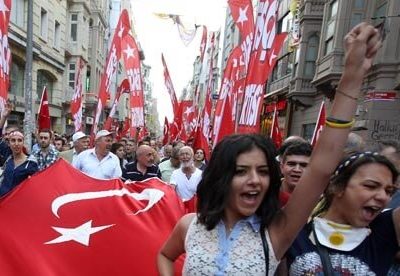Triggered by plans to transform a park into development land, protests and riots have broken out in Istanbul for the past few days and have begun to symbolize a movement towards a better democracy in Turkey.
With a lack of response from the Turkish government, and with reports of citizen camp-outs and police brutality, Turkey may be starting to experience its own Occupy movement.
Istanbul’s Gezi Park was scheduled to be demolished at the end of May in order to build a business and shopping center. Citizens camped out in the park the night before development work was supposed to begin with plans to peacefully protest the next morning.
Instead, the opposite happened. Riot police were called in and used water guns and pepper spray to try and evacuate the area. As demolition of the park continued, protests grew and expanded to nearby Taskim Sqaure, where clashes with police led to many civilian injuries. Monday marked the first day an official death has been associated with the demonstrations; a 20-year old man was killed by a taxi that ran into a crowd of protestors, according to the Guardian.

Protests began because people felt that the park was one of the only remaining green spaces in Istanbul, but grew as a protest against infringement of civil freedoms and against the policies and doings of Prime Minister Recep Tayyip Erdogan.
“It reminds me a lot of the Occupy protests, especially in the beginning,” says Gabby Kashtelian, a senior at Boston University majoring in philosophy and journalism. “Something sparked the protest, but it grew because people realized how unfair the government was towards people peacefully voicing their concerns and fears.” Kashtelian participated in Occupy Boston and Occupy BU last year on campus. An “Occupy Gezi” Facebook page has already been set up and has over 30,000 likes.
Over the past few days, the protests spread to Ankara, among other cities. Police have used water cannons and tear gas to disperse “riots” and peaceful protests. The prime minister has denounced the protestors and called their actions undemocratic, according to The Guardian. Ironically, though, some reports say that from afar, some of the protests looked more like a celebration with all of the singing and chanting, the BBC reported. Still, tens of thousands of people continue to protest.
“The park is just a symbol,” Kashtelian said, “Just like Dewey Square in Boston or Zuccotti Park in New York. It’s already grown to represent a larger issue that people are angry about. When people got kicked out of Dewey, they resisted not just because of their rights, but because the occupation physically represented their anger towards the government.”
Citizens of Turkey are unhappy with the government’s lack of democracy; although the country is officially secular, many feel that Erdogan is beginning to use conservative Islamic values and beliefs to influence his government actions and decisions, the BBC reports. Just last week, for example, the Turkish government passed a law that would control and limit the amount of alcohol both sold and advertised.
Kashtelian says that the protests are similar to Occupy in some negative ways as well. “When the issue grows so large, the protest soon becomes unorganized and unfocused,” she said. “It seems like the people in Turkey have started a good thing…hopefully they can keep it alive long enough for the government to really start to care.”
Check out some images of the past week in Turkey here.
Photos from guardian.co.uk and yahoo.com



















